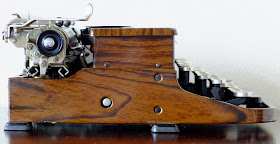Don Bradman at his "faithful" typewriter. He wasn't too faithful to it, however, and replaced it four years later, in 1934. No one knows where his first Royal portable is now.
With excitement mounting ahead of the one-day cricket World Cup, to be staged in Australia and New Zealand from February 14-March 29 (I'm tipping New Zealand to beat South Africa in the final), it's timely to reveal Sir Donald Bradman's first portable typewriter. The image above has not hitherto been available online.The Don's first Royal portable was a Model P, which he acquired before his first tour to England with the Australian cricket team, in the northern summer of 1930. Bradman bought the typewriter from Sydney Pincombe Ltd at 46-48 Hunter Street, Sydney, with the aim of answering every single bit of the massive amounts of fan mail he received during the six months-long tour:
The Don carries his typewriter to The Oval in London in 1930
Bradman receives fan mail telegrams in the middle of the pitch in 1938
Bradman's typewriter is interesting in that, perhaps anticipating Bradman would be photographed using it from a side angle, Sydney Pincombe had a large Royal decal placed on the side. The faux woodgrain brown paintwork is also quite pronounced, as in this earlier model Royal which belongs to Nick Beland:
There is also a fine example of a Model P with this paintwork here:
This is the only typewriter Bradman was ever photographed using. In 1934, after he had moved to Adelaide in South Australia, he was given a later model Royal portable to use on his second tour to England with the Australian team. This Royal is now in the South Australian State Library:
Acquiring a second Royal followed the Australian Board of Control's refusal to allow Bradman to write for newspapers during the
1932–33 Ashes series against England. Only professional journalists were entitled to do so. Bradman was adamant he would honour his writing
contract, even if it meant not playing. The editorial chief of Associated Newspapers, R.C. Packer, (grandfather of Kerry
Packer) agreed to release him from the obligation.
Sir Donald George Bradman is, quite simply, the greatest cricket batsman who ever lived. Usually referred to as "The Don", Bradman had a 20-year career Test batting average
of 99.94 - often cited as the greatest achievement by any sportsman in any
major sport. In his last Test innings, at The Oval in London in 1948, Bradman when into bat with an average of 101.39, but was bowled for a duck second ball. If he
had scored just four runs, his average would have been 100.
On a goodwill tour by an Australian team to North America in 1932, The Don met The Babe, Babe Ruth:
It was a meeting of the two greatest hitters of the moving ball in world sports history. It happened in Ruth's private box at Yankee Stadium in New York on July 20, 1932. The Yankees were playing the Chicago White Sox and Ruth was injured. John Kieran wrote in The New York Times: "Babe
Ruth once knocked 60 home runs in a season. What's that to Daring Don Bradman,
the ring-tailed wallaby of the cricket crease? He scored 452 runs (not out) in
an afternoon. He simply keeps hitting and running until some sensible person in the stands suggests a spot of tea."
On the same tour, Bradman (seated far right, second row from bottom) and other Australian players met the
cast of The Mask of Fu Manchu, including cricketing Hollywood actors Boris Karloff and Sir Charles Aubrey Smith (in front of Bradman; Smith once captained England in Test cricket). Myrna Loy is in the middle front row:
Bradman died, aged 92, on February 25, 2001. He continued to use a typewriter to reply to fan mail until well into the 1990s. Today, feelings about The Don and his playing, captaincy and administrative roles in Australian cricket are mixed, though he still has many supporters. My own dealings with him, starting in 1970, were always very cordial. Whatever else may be said about him, in person he was a most impressive man.
Here is a sample of The Don's typing, using his second Royal portable in 1938:
And from 1991:
The Baby Don
When there was still a cultural cringe in Australia:
Mobbed after a world record Test innings in Leeds in 1930
With members of the England team in Queensland in 1928




































Hello Robert,
ReplyDeleteThis is excellent information for my current book about the Business of Bradman. Can you please provide a reference for tho photo of Bradman at his typewriter and for the letter to his boot manufacturer?
Kind regards,
james.merchant@icloud.com